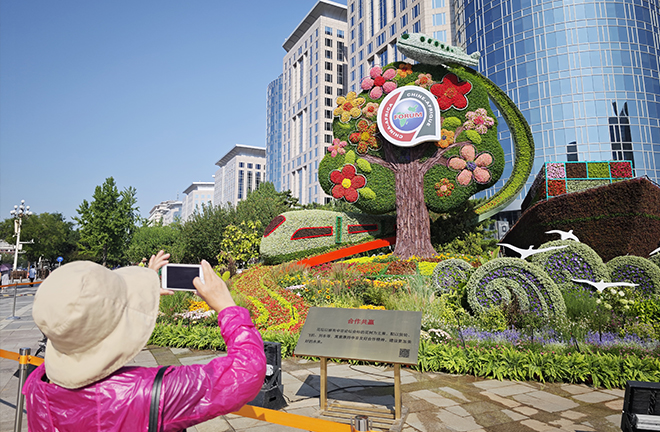FOCAC summit upgrades China-Africa ties

A parterre decorated for the FOCAC summit under the theme of “Cooperation and Win-Win” at Chang’an Street in Beijing Photo: Lyu Jiazuo/CSST
“I propose that bilateral relations between China and all African countries having diplomatic ties with China be elevated to the level of strategic relations, and that the overall characterization of China-Africa relations be elevated to an all-weather China-Africa community with a shared future for the new era,” stated Chinese President Xi Jinping during his keynote address at the opening ceremony of the 2024 Summit of the Forum on China-Africa Cooperation (FOCAC), which was held from Sept. 4–6 in Beijing.
Both Chinese and African analysts have praised Xi’s remarks, noting that the China-Africa relationship has steadily progressed—from a new partnership to a comprehensive strategic partnership, and now to an all-weather community with a shared future. This evolving relationship has been continuously renewed with clearer positioning and richer connotations, shining more brilliantly in the new era.
Milestone significance
According to Wu Sike, former Chinese ambassador to Egypt and Chinese representative to the League of Arab States, the term “all-weather” signifies that, regardless of global changes, China and Africa will stand together through weal and woe, cooperating to weather all challenges as usual.
Commenting on the signal the Beijing summit has conveyed to the world, Allawi Ssemanda, a senior research fellow and executive director of the Development Watch Center in Uganda, said in an interview with CSST that this summit has propelled the China-Africa relationship into a new era, holding milestone significance in the history of bilateral relations. Amid increasing uncertainty and instability in the international landscape, the Beijing summit stands out as an extraordinary event, infusing positive energy into the turbulent world while offering hope to the struggling global economy.
The 2024 Beijing summit marks the fourth time that the FOCAC meeting has been held as a summit. Yusuf Ali Zoaka, a professor of political science and international relations at the University of Abuja in Nigeria, told CSST that FOCAC has stood the test of time, with each summit introducing valuable new elements to the China-Africa relationship. The Beijing summit not only mirrors shifting global priorities but also serves as a testament to the history and current state of China-Africa ties.
Jointly advancing modernization
“China and Africa account for one-third of the world population. Without our modernization, there will be no global modernization,” noted Xi at the summit. He called for joint efforts in advancing modernization that is just, equitable, open, win-win, people-centered, inclusive, eco-friendly, and underpinned by peace and security.
Describing the proposal as pragmatic and innovative, Yu Jia, director of the Department of International Development Cooperation at the Institute of New Structural Economics under Peking University, asserted that Chinese modernization serves as a practical reference for Africa’s development, adhering to general principles while aligning with China’s specific circumstances. In particular, Chinese experience in building industrial parks and special economic zones offers Africa inspiring models for advancing its infrastructure build-out.
Industrialization is an inseparable part of modernization. In the view of Zhang Zhenke, director of the Institute of African Studies at Nanjing University, China-Africa cooperation is highly promising. Chinese entrepreneurs have already established nearly 40 industrial parks in Africa and investment from Chinese enterprises will continue to assist African nations to nurture industries such as construction materials, light industry, and household appliances.
China has been Africa’s largest trade partner for the past 15 consecutive years, as the ratio of China-Africa trade volume to Africa’s total foreign trade has been rising steadily. By the end of June 2024, China had implemented zero tariffs on 98% of products imported from 27 of the least developed countries in Africa, and signed both bilateral agreements on the promotion and protection of investment with 34 African countries, and agreements on the elimination of double taxation with 21 African countries.
Among the 10 partnership actions for modernization that Xi put forward to deepen China-Africa cooperation and spearhead the Global South modernization, Ssemanda pointed out that the Partnership Action for Green Development is particularly noteworthy. China’s move to launch 30 clean energy projects in Africa will not only further ensure environmental protection and sustainable development in the continent, but also raise GDP growth rates in a broader sense, opening up brighter prospects for Africa’s economic development.
In African countries like Uganda, agriculture is the pillar of the economy, Ssemanda continued. China’s agricultural fund support for these countries has significantly lowered local starvation, poverty, and mortality rates, while substantially improving the wellbeing of local populations.
Zoaka added that China and Africa, whose populations account for one-third of the world’s total, are indispensable forces of global development. The China-proposed Belt and Road Initiative and Global Development Initiative are being organically aligned with Africa’s development strategies such as the African Union Agenda 2063. Representing the common aspirations of more than 2.8 billion Chinese and African people, these initiatives and strategies will set off a new wave of modernization in the Global South, he predicted.
Edited by CHEN MIRONG

 PRINT
PRINT CLOSE
CLOSE